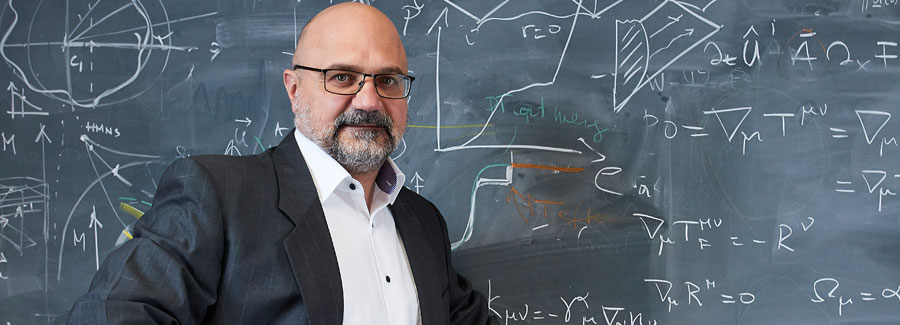
For his outstanding contributions in the field of astrophysics, Luciano Rezzolla, Professor for Astrophysics at Goethe University, will be appointed Andrews Professor of Astronomy at Trinity College in Dublin. Previously combined with the leadership of the Irish Dunsink Observatory, today the title is a prestigious honorary chair. The appointment of Luciano Rezzolla represents the first time the professorship will be given to a non-Irish person.
“The Andrews Professor for Astronomy is a tremendous recognition of the excellence achieved in astrophysics research at Goethe University,” says Luciano Rezzolla. “It’s simultaneously a recognition of a paradigm change that has also taken place in Frankfurt, in which theoretical astrophysics and theoretical physics are being combined more and more in the quest for a deeper understanding of the universe. I am very happy that together with my team and many other colleagues in Frankfurt and Dublin, I have been able to use this potential to continue improving our research.
“This title is a great honour, both for Luciano Rezzolla and for his team at the Institute for Theoretical Physics”, says Simone Fulda, Vice President for Research and Academic Infrastructure at Goethe University. “The award illustrates the high value placed on physics within Goethe University research. We are quite proud of this and extend Luciano Rezzolla our warmest congratulations.”
The Andrews Professor for Astrophysics was established in 1774. The politician and provost of Trinity College, Francis Andrews, bequeathed £3,000 to build a new observatory in Dunsink. The first Andrews Professor was the mathematician and astronomer Henry Ussher, who was appointed in 1783. Between 1791 and 1921 the holder of the chair was also the “Royal Astronomer of Ireland”. After remaining vacant between 1921 and 1984, the position was subsequently re-established as an honorary chair. With this appointment, Rezzolla follows in the footsteps of Sir William Rowan Hamilton, who held the position from 1827 to 1865, and after whom Hamiltonian mechanics was named.
In addition to this honour, Rezzolla gained worldwide media attention in April of this year. As principal investigator of the “Black Hole Cam Project” (BHC Project), he and his colleagues made the observation of the hot plasma ring surrounding the black hole in the centre of the Galaxy M87 visible for the first time. The National Science Foundation, the US government agency for research funding, recognized the first image of black hole with a new prize: in 2019, the Diamond Achievement Award was given to the international team of the Event Horizon Telescope collaboration, of which Professor Rezzolla is also a member. Rezzolla and his team at the Institute for Theoretical Physics were also awarded the Frankfurt Physics Science Prize.
Publication: https://ipfs.io/ipfs/QmXoypizjW3WknFiJnKLwHCnL72vedxjQkDDP1mXWo6uco/wiki/Andrews_Professorship_of_Astronomy.html








